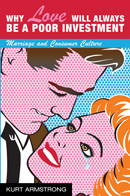 I do not read many books on relationships. Perhaps this is because, it seems to me, they are chocked full of contrived platitudes. Whether it’s five love languages or six relationship principles, there is sure to be banal and meaningless advice from misogynistic pastors, counselors, or their wives, or for some reason, businessmen. This relationship book will be telling me to “kiss dating goodbye” and that one to “give dating a chance.” It is refreshing, then, to find a book about relationships, but surely not simply a relationship book, like Why Love Will Always Be A Poor Investment: Marriage and Consumer Culture.1
I do not read many books on relationships. Perhaps this is because, it seems to me, they are chocked full of contrived platitudes. Whether it’s five love languages or six relationship principles, there is sure to be banal and meaningless advice from misogynistic pastors, counselors, or their wives, or for some reason, businessmen. This relationship book will be telling me to “kiss dating goodbye” and that one to “give dating a chance.” It is refreshing, then, to find a book about relationships, but surely not simply a relationship book, like Why Love Will Always Be A Poor Investment: Marriage and Consumer Culture.1In a series of 17 essays Kurt Armstrong attempts2 to convince us that love is not worth it, that marriage is hard, and that kids are “unbelievably more difficult,” but that if you are able you should participate in all three. Despite what we might learn from consumer culture, love and marriage are not (always) sexy, easy, or glamorous. Married love is hard work that runs counter to the consumerist mindset. But, Armstrong rightly points out that he is not arguing for “traditional marriage” or the good-old days that many “family” groups are calling for. Armstrong writes,
“I stand with those who stand against the narrow, dehumanizing roles that . . . traditional marriage often created for women and for men. Appealing to the values of utopian “good old days” often means returning to an era riddled with institutionally sanctioned injustice. Many of the things that happened behind the closed doors of these good Christian homes were anything but Christian, and the stamp of supposedly divine approval does not make oppression and patriarchy any less oppressive or patriarchal.” (63)
Overall the essays are very good. Some felt a bit saccharine, but perhaps this is just the overflowing of an author who is obviously in love with his wife. The more sentimental reader may enjoy these portions. Other essays however, detail the real, lived experience of a committed relationship, the fights and the slights that come from spending all one's time with another person. In an essay entitled, "Bring Your Toothbrush to the Avalanche," Armstrong deftly narrates a fight with his wife that took place over the course of an otherwise normal day. The scene is familiar to anyone who has been in a relationship (and been in a fight) and the reader will surely share the author's frustration and animosity, until the poignant and moving ending: “’I forgive you,’ I say, and as the wall between us crumbles, we find our way back to one another, back to love that is broad enough for the two of us and our trivial, terrifying, impossible differences.” (83)
Another essay that I found refreshing was called, “Jesus Loves Your Penis, Son.” Now, while this type of sentiment can be dangerous, in that much of war, oppression, misogyny, and sexual abuse has been a result of men loving their penises far too much. I think the sentiment that Armstrong is trying to counter here is that tradition of thought that has been influenced by the long shadow of St. Augustine’s Penis.3 The loathing of the organ we cannot control. The Church has been infamously bad at talking to young people about sex and masturbation. It has been seen as “every young man’s battle,” or perhaps we were told by Kirk Cameron and Ray Comfort that because we gave that girl or guy a longing stare we will be condemned to hell. So it is with a sigh of relief that one reads Armstrong’s advice to his son4,
So son, if you want to play with your penis, go for it. When one day those hormones in your body kick into high gear and all you seem to be able to think about is sex and you discover just how much fun masturbation can be, don’t let guilt and shame take the fun out of it for you . . . And if well-meaning religious folks tell you it’s an abomination or that God is scowling at you every time you touch yourself, remember this: God made your penis. (31-32)
There are certainly some feminist or queer critiques that could be made of Armstrong’s portrait of love and married life. Or one could argue that Armstrong doesn’t go far enough in denouncing Capitalism. But, the book is not meant to be an exhaustive treatise on marriage. Armstrong is not handing down tried and true principles or laying out 10 relationship laws. He is not pontificating sexual dogma. He is simply exploring the mystery of love, the mystery of marriage.
“Marriage is a mystery; words are a mystery:” it feels like a cheap excuse for an answer, but it’s the nearest thing I can find for an explanation. I cannot find absolutes or certainty in them, and I get no closer to what I sometimes think I am looking for by working harder and harder at it.” (90)
This book should suit a wide audience. It is progressive, yet conservative. It is written with an evangelical fervor, but has an edge that will appeal to post-Evangelicals. I think that this would be a good resource for pastors to give to their parishioners. I especially think that Youth Pastors should use it when talking about relationships to students. Married couples (and those long-term couples who are so unjustly not allowed to marry) should read this together if only to remember that they are not the only couples who go through the pain and agony, the joy and beauty of love.
